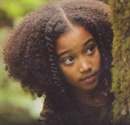 When I read The Hunger Games last year, one game contestant from the first book stood out from the others: Rue, the 12-year-old from one of Panem’s agricultural districts. Katniss, who volunteers for the games to protect her own 12-year-old sister, forms an alliance with Rue, even though they both know that if it comes down to just the two of them, one will have to kill the other.
When I read The Hunger Games last year, one game contestant from the first book stood out from the others: Rue, the 12-year-old from one of Panem’s agricultural districts. Katniss, who volunteers for the games to protect her own 12-year-old sister, forms an alliance with Rue, even though they both know that if it comes down to just the two of them, one will have to kill the other.
Imagine my surprise in stumbling upon a web site called Hunger Games Tweets, a collection of Twitter messages from people who saw the recently-released movie version of the first book and were upset to see a black actress playing Rue’s part. They didn’t realize Rue was black. And they didn’t like it. And they said some pretty horrible things.
Like this: “Awkward moment when Rue is some black girl and not the little blonde innocent girl you picture.” Or this: “Kk call me racist but when I found out rue was black her death wasn’t as sad.” And worse … much worse.
The site’s creator, a Canadian fan of the books and the movie, was reading Tweets labeled with the #hungergames tag when he noticed the trend. He eventually collected hundreds of similar Tweets, showcasing them on his Tumblr site.
The Tweets show two things: one, that a lot of readers somehow missed the fact that Rue is clearly described in the book as a black girl; two, that a lot of Americans don’t give a shit what happens to black kids.
And that explains not only the incredibly racist right-wing backlash against Trayvon Martin, but the media’s general lack of interest in reporting on missing, abused, and murdered black children and teenagers — they know their white viewers, listeners, and readers simply don’t care to hear about such things.
Liberals frequently deplore what they describe as America’s racist underbelly, with emphasis on the term “underbelly” … as if American racism is something you have to push aside layers of non-racist belly flab to get at. I don’t know. It looks like a belly to me, a big old pot-gut of nastiness right out there for everyone to see. Actually, you know what? Forget belly. It’s America’s racist face.
My favorite quote on Hunger Games Tweets? This one:

When Anna Holmes at The New Yorker profiled the Hunger Games Tweets site and its creator, she pulled an interesting head-fake on readers. Here’s one reader’s description of it, posted to the Hunger Games Tweets site:
So … this article just proved to me that I do it. We all do it. This article profiles someone of the pseudonym Adam, the person who created the Hunger Games Tweets Tumblr site. It talks about interviewing him in his office in Toronto. I imagined in the interview in my head. Adam was white. Until the author mentioned in the last paragraph that Adam is of Caribbean descent. Then he switched to black. I defaulted him as white, because I had no indicators to the contrary. It makes me so mad at myself and society that we do these things. I imagined Rue as black because it says she has dark skin in the books, but in this article, with skin color not described, I did not. GUH.
And here’s Adam’s response, also from the Hunger Games Tweets site:
Since I’m that “Adam” guy referred to in the article, I guess I never had to bother imagining what I look like. And I never bothered to assume that others would either. To hear that you imagined me white throughout the article (until learning at the very end that I’m actually black) is a bit fascinating. It just proves that when people are described using non-racial identifiers, we’re really all the same. This is what happened to Rue. She was given very ‘mainstream’ qualities rather than biased ones based on stereotypes. Still doesn’t explain how so many people missed the actual racial identifier that she was given, but I’ve given up on that phenomenon now. Now I can’t help but wonder if Anna Holmes wrote the article this way on purpose.
Default on race attribution: Just imagine all the men as Lance Reddick. I know I do.